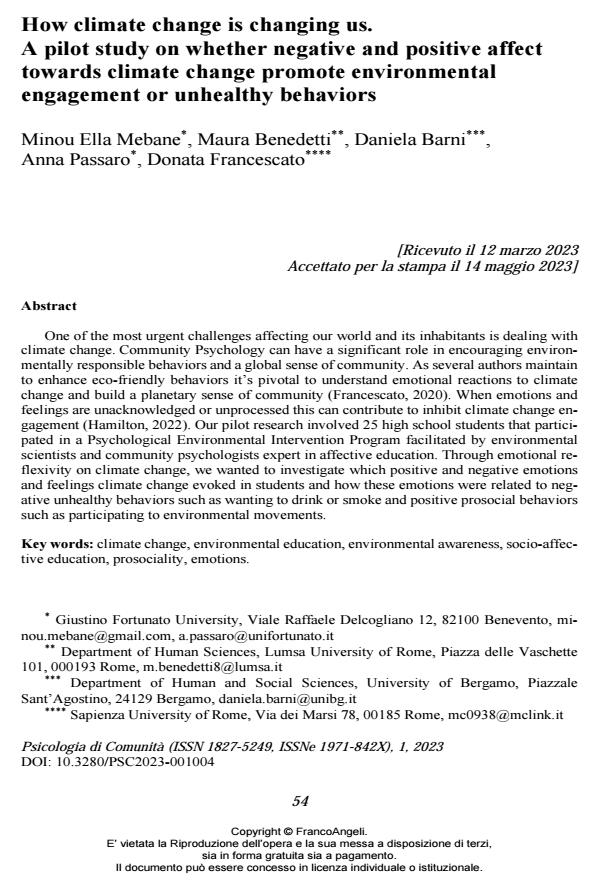How climate change is changing us. A pilot study on whether negative and positive affect towards climate change promote environmental engagement or unhealthy behaviors
Titolo Rivista PSICOLOGIA DI COMUNITA’
Autori/Curatori Minou Ella Mebane, Maura Benedetti, Daniela Barni, Anna Passaro, Donata Francescato
Anno di pubblicazione 2023 Fascicolo 2023/1
Lingua Inglese Numero pagine 20 P. 54-73 Dimensione file 232 KB
DOI 10.3280/PSC2023-001004
Il DOI è il codice a barre della proprietà intellettuale: per saperne di più
clicca qui
Qui sotto puoi vedere in anteprima la prima pagina di questo articolo.
Se questo articolo ti interessa, lo puoi acquistare (e scaricare in formato pdf) seguendo le facili indicazioni per acquistare il download credit. Acquista Download Credits per scaricare questo Articolo in formato PDF

FrancoAngeli è membro della Publishers International Linking Association, Inc (PILA), associazione indipendente e non profit per facilitare (attraverso i servizi tecnologici implementati da CrossRef.org) l’accesso degli studiosi ai contenuti digitali nelle pubblicazioni professionali e scientifiche.
One of the most urgent challenges affecting our world and its inhabitants is dealing with climate change. Community Psychology can have a significant role in encouraging environ-mentally responsible behaviors and a global sense of community. As several authors maintain to enhance eco-friendly behaviors it’s pivotal to understand emotional reactions to climate change and build a planetary sense of community (Francescato, 2020). When emotions and feelings are unacknowledged or unprocessed this can contribute to inhibit climate change en-gagement (Hamilton, 2022). Our pilot research involved 25 high school students that partici-pated in a Psychological Environmental Intervention Program facilitated by environmental sci-entists and community psychologists expert in affective education. Through emotional reflex-ivity on climate change, we wanted to investigate which positive and negative emotions and feelings climate change evoked in students and how these emotions were related to negative unhealthy behaviors such as wanting to drink or smoke and positive prosocial behaviors such as participating to environmental movements.
Una delle sfide più urgenti che interessano il nostro mondo e i suoi abitanti riguarda il cambiamento climatico. La psicologia di comunità può svolgere un ruolo significativo nell’incoraggiare comportamenti ecologicamente responsabili e un senso globale di comunità. Come sostengono diversi autori, per migliorare i comportamenti eco-compatibili è fondamenta-le comprendere le reazioni emotive al cambiamento climatico e costruire un senso planetario di comunità (Francescato, 2020). Quando le emozioni e i sentimenti non vengono riconosciute o non vengono elaborate, ciò può contribuire a inibire l’impegno nei confronti del cambiamento climatico (Hamilton, 2022). La nostra ricerca pilota ha coinvolto 25 studenti delle scuole supe-riori che hanno partecipato a un progetto di intervento di psicologia ambientale facilitato da esperti in tematiche ambientali e psicologi di comunità esperti in educazione socio affettiva. Attraverso la riflessione emozionale sul tema del cambiamento climatico, si è indagato quali emozioni e sentimenti positivi e negativi il cambiamento climatico ha evocato negli studenti e come queste emozioni fossero correlate a comportamenti negativi per la salute come voler bere o fumare e comportamenti prosociali positivi come partecipare a movimenti ambientali.
Parole chiave:cambiamento climatico, educazione ambientale, consapevolezza ambientale, educazione socioaffettiva, prosocialità, emozioni, sentimenti.
Minou Ella Mebane, Maura Benedetti, Daniela Barni, Anna Passaro, Donata Francescato, How climate change is changing us. A pilot study on whether negative and positive affect towards climate change promote environmental engagement or unhealthy behaviors in "PSICOLOGIA DI COMUNITA’" 1/2023, pp 54-73, DOI: 10.3280/PSC2023-001004